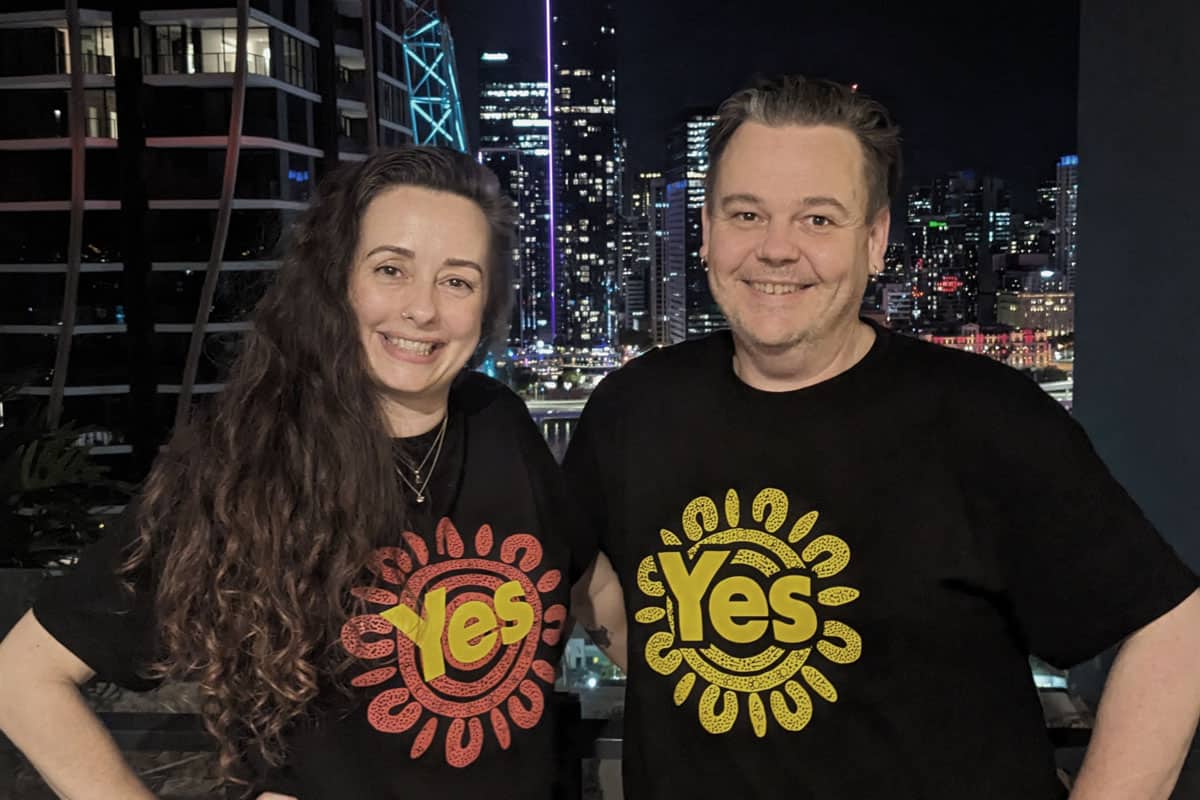The Australian people have an opportunity, and a responsibility, to try to end the disparity and inequality that Indigenous Australians face. A chance to provide First Nations people with access to decision making, real influence, and responsibility for their own futures. Who wouldn’t want that?
These are our thoughts on why we are voting YES to the Aboriginal and Torres Strait Islander Voice proposal, and why we believe it’s a good idea and a positive step for Australia. We have the utmost respect for many of those who are choosing to vote NO and appreciate many have very good reasons for doing so. This is especially true for the Indigenous voices who are against the proposal.
Many say the current proposal doesn’t go far enough, and that the offer is tokenistic. We can certainly see that argument. Others say it goes too far and offers too much power to a minority. To that, we strongly disagree.
While the majority of the piece focuses on why we’re voting YES, we also discuss the political arm of the NO argument that seems to be content using arguments of fear, misinformation, and ignorance. They seem to oppose just for the sake of opposition rather than providing good and decent reasoning.
We have researched and have referenced related articles and books where relevant. When listing news sources, we have tried to avoid sites with paywalls so that you can click through to read those pieces. Sometimes referencing paywalled articles was unavoidable. We have not been reliant on our usual choice of progressive media sources, such as Crikey, The Saturday Paper, and the Guardian, and have leaned heavily on more politically conservative publications, such as The Australian, news.com.au, and Sky News. This is to show that our arguments are based on fact, being that they are being reported on both sides.
This is not an exhaustive list of reasons, or rebuttals to the NO argument, simply because of the time that would take.
The rally and chalk photos were taken by us at the YES rally in Melbourne on 17 September 2023.
Most First Nations people are in favour of the Voice to Parliament
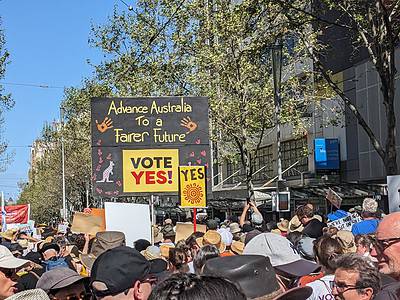
Current stats put the figure of First Nations support for the Voice at around 80%.
One argument for voting NO is that not all First Nations people support the proposal, so therefore everyone should vote against it. This seems pretty illogical to us, and far from democratic.
Of course, 100% of a group aren’t always going to support the same things. There are internal disagreements with justifiable differences in views.
The Uluru Statement from the Heart states that constitutional recognition is what has been asked for. Anything less would be against the Uluru Statement, which has majority Indigenous support.
If for no other reason, such high First Nations support should be your reason for voting YES.
First Nations Peoples asked for a Voice in the Uluru Statement from the Heart and 83% of First Nations Peoples support it.
What is the Voice? – The Uluru Statement
You have nothing to lose from this referendum passing. Unless you are an Indigenous Australian, then it won’t affect you at all (more on that later). Just like the Marriage Equality plebiscite, the fact that most people who would be actually impacted by it were in favour of it should be all you needed. Just because your neighbour can marry whoever they like does not impact you at all.
Unless you’re an Indigenous Australian, the outcome will make zero difference to you
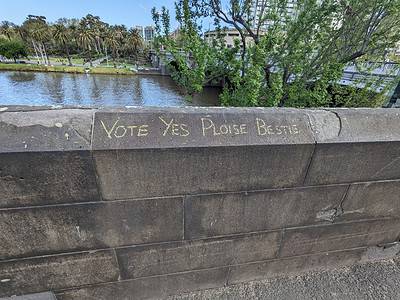
This is one area where we just do not understand many arguments of the NO camp. If you are not a First Nations person, your life will not change in the slightest on, or after, October 14 as a result of this referendum. It doesn’t matter the result – it will have no impact on you whatsoever.
As Joe Hildebrand (news.com.au 2023) states: “But for the three per cent or so Indigenous Australians – especially those in remote and regional communities – this is probably the single most important issue in their lives simply for the potential of the change it could bring.”
I’m not usually a fan of Hildebrand’s journalism, but this piece, “Reasons you can just vote Yes and get on with your lives,” is well worth the read, especially if you are a conservative who is considering voting No.
And for the record, there is no Constitutional Pie. What we mean by this is that just because Indigenous Australians get a Voice in the Constitution does not mean your Constitutional rights are somehow lessened or diminished.
Yes, the Voice does need to be in the Constitution
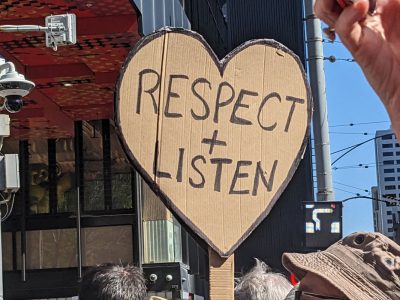
For decades there have been multiple ‘top down’ approaches that clearly have not worked. As has been stated in various forums on the topic, 235 years of not listening is not working.
Over the last 60ish years there has been:
- Council for Aboriginal Affairs: 1967–76
- National Conference of Aboriginal and Torres Strait Islander Advisory Councillors: 1972
- National Aboriginal Consultative Committee (NACC): 1973–77
- National Aboriginal Conference (NAC): 1977–85
- Aboriginal and Torres Strait Islander Commission (ATSIC): 1989–2005
- Council for Aboriginal Reconciliation: 1991–2000
- National Indigenous Council (NIC): 2005–07
- National Congress of Australia’s First Peoples (NCAFP): 2009–19
- Prime Minister’s Indigenous Advisory Council (PMIAC): 2013–2019
- Special Envoy for Indigenous Affairs: 2018–2019
- Coalition of Peaks: 2018–present
You can find a more exhaustive guide to all these committees, conferences, commissions etc at the ironically titled Former Aboriginal and Torres Strait Islander Australian Government representative and advisory bodies: a quick guide. For the record, it’s not a quick guide at all – it’s depressingly long.
Including the Voice in the Constitution ensures that it cannot be abolished at the whim of the next government, unlike most of the other items we have just listed. And, more importantly, it means that any new committees, conferences, commissions, etc actually have First Nations representation, which many of those listed did not.
ATSIC is one of the notable exceptions here, as Indigenous Australians chose its members. ATSIC was abolished after 15 years, which goes back to the point of having the Voice in the Constitution so that could not happen.
Some of those bodies mentioned were not actually legislated, meaning the minister of the day could dissolve them without parliament.
The Voice can change over time, and the government of the day can choose to not even listen to it. Being in the Constitution gives it the power of longevity.
The Uluru Statement from the Heart seeks “constitutional reforms to empower our people and take a rightful place in our own country.”
“We call for the establishment of a First Nations Voice enshrined in the Constitution.”
What we as a nation are being asked is to add this Voice to the Constitution.
It is a voice. It is not a law making machine or some sort of boogeyman that will claim your land. The Voice is an advisory body to advise the government on policy to do with Indigenous Australians.
That’s it. It’s not difficult, and it’s not scary.
As noted by Appleby, Lindell and McGlade (2023), “The Voice will give Aboriginal and Torres Strait Islander people a constitutionally guaranteed right to speak to government and the parliament about what’s needed for practical improvements to people’s lives. This, in turn, would help address disadvantage and systemic discrimination.”
Scott Stephenson, Associate Professor of Law at The University of Melbourne explains how constitutionally conservative the Voice is: No, the Voice isn’t a ‘radical’ change to our Constitution.
The Voice will provide advice to the Parliament on proposed laws affecting First Nations peoples. It’s that simple. This means that Parliament will be better informed. Why on earth would anyone think that’s a bad idea?
More effective government policy can be implemented, such as health, education, and many other factors impacting inequality.
“They do not listen because they do not have to.”
Yunupingu – as quoted in Quarterly Essay 90 “Voice of Reason”
“A Voice cannot be truly independent or offer frank advice if it lives with the threat of abolition.”
Megan Davis – in Quarterly Essay 90 “Voice of Reason”
It will not be a third chamber of parliament and will not be able to create laws
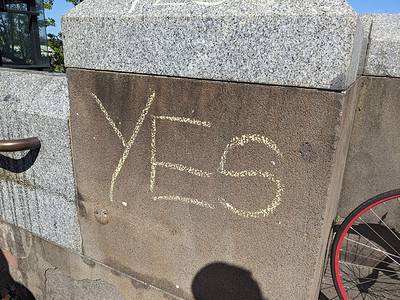
There’s an awful lot of disinformation being spread around. One corker is that a Voice would amount to a third chamber of Parliament and therefore impact Parliamentary sovereignty.
As noted by Katie O’Bryan and Paula Gerber of Monash University (2023), this is about a “Voice to Parliament, not a Voice in Parliament.” It is an advisory body, not a law-making machine.
The wording of the Constitutional Amendment is very clear. It is that the body may make representations to the Parliament and the Executive Government. It does not state that this is part of the government, or that the government even needs to listen. It certainly does not state the government is under any compulsion to act on anything the Voice says.
In recognition of Aboriginal and Torres Strait Islander peoples as the First Peoples of Australia:
- there shall be a body, to be called the Aboriginal and Torres Strait Islander Voice;
- the Aboriginal and Torres Strait Islander Voice may make representations to the Parliament and the Executive Government of the Commonwealth on matters relating to Aboriginal and Torres Strait Islander peoples;
- the Parliament shall, subject to this Constitution, have power to make laws with respect to matters relating to the Aboriginal and Torres Strait Islander Voice, including its composition, functions, powers and procedures.”
Referendum question and constitutional amendment – voice.gov.au – emphasis added
But there's no detail!
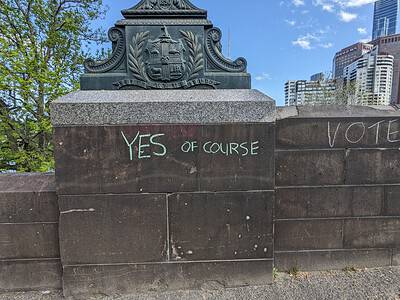
The pearl-clutching about the lack of detail in the referendum is frustrating. The question is simple, YES or NO. The detail comes later. And the detail does not go in the Constitution.
If you’re one of the people asking about detail, I have a very serious question for you – when was the last time you asked about detail about anything to do with the Constitution or an act of Parliament? And why is it so important to you now?
The role of the constitution is to provide context, while the parliament is where detail is determined. The detail can change over time as is required, but the core context (ie: The concept of a Voice) stays.
Peter Dutton and other NO vote proponents who are using the “lack of detail” argument know this, which adds to the argument that they are being duplicitous with their complaints (more on that later).
Let’s make this simple. Let’s imagine you’re planning a holiday to America, and you and I are having a chat. I ask you where in America you’re going, and you say to me “we don’t know yet – it’s too early for the detail – we’re just working out if we can do it, and when – then we’ll work out the detail.” Do you think a reasonable response from me would be to advise that you shouldn’t make a decision unless you have all the detail first? Of course not.
As far as the design of how it would work, the government has gone to great lengths to provide that potential detail in the Design Principles of the Aboriginal and Torres Strait Islander Voice.
This seems to be a document that the NO camp cannot find or read.
Our point is that we aren’t voting on minute details – we’re voting YES or NO to having the Voice.
“The panel was unanimous in their view that the referendum proposal is simple, straightforward, safe and modest. Its strength is its simplicity.
“It reflects how Constitutional amendment should occur and has in the past, in that it asks the public to vote on a principle and leaves it to Parliament to implement the detail.”
Law Council of Australia – Voice to Parliament is legally safe
Some argue that the reason the Referendum regarding Australia establishing itself as a republic failed because there was too much detail in the question.
Let’s consider the 1999 referendum question:
A proposed law: To alter the Constitution to establish the Commonwealth of Australia as a republic with the Queen and Governor-General being replaced by a President appointed by a two-thirds majority of the members of the Commonwealth Parliament.
Australian Electoral Commision: 1999 Referendum
There were considerable supporters of a republic who did not want the head of state to be voted by the Parliament but by the people. Had the question been more along the lines of A proposed law: To alter the Constitution to establish the Commonwealth of Australia as a republic., then the results would likely have been quite different, and you and I might be living in a republic right now. The detail on how that head of state were to be elected, and what powers they would have would have come later and have had much debate with final decisions coming forth in a democratic manner.
But there's not a Voice for the Chinese, Spanish, New Zealander's or any other group
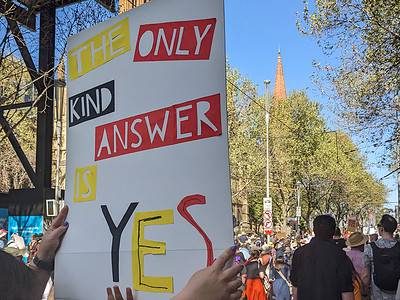
Correct, there is no proposal for a Constitutional Voice for any other group. That’s because the government doesn’t make laws specifically for other nationalities or groups. The government does make laws specifically for Aboriginal and Torres Strait Islanders. And, unsurprisingly, Aboriginal and Torres Strait Islanders would like the opportunity to give advice on those laws.
It’s not that hard a concept to grasp.
The Voice is not divisive, unless we vote NO
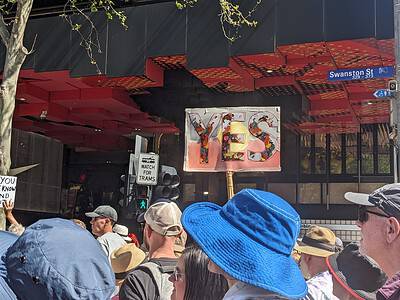
There is an argument that the Voice divides the nation when we should be concentrating on unity.
What is divisive is if Australia collectively votes NO on October 14.
The Voice asks for a voice. That’s it.
“No” we don’t want to listen.
“No” we don’t think you can advise on best policy for yourselves.
“No” we won’t recognise you in this Constitution that has been in existence for all of 5 generations versus your thousands of generations.
“No” we do not want to work together for a better future.
That’s what the message will be if you vote NO, even if that’s not your intention. This is a once in a generation opportunity, that while not perfect, is far better than what we have now.
The most vocal parts of the NO campaign are based on fear, and misinformation, not on a progressive society
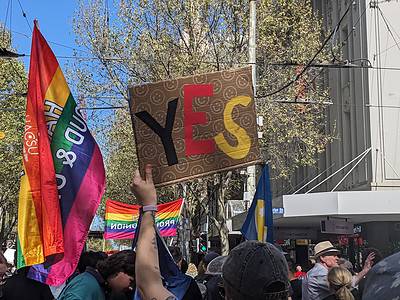
The Yes | NO referendum pamphlet that has likely ended up in your letterbox has equal space for YES and NO arguments. Did you know that this content did not need to be fact checked?
Do you also see that almost every single point brought by the NO argument is completely based on fear with no explanation? Which in itself is somewhat ironic considering the calls from this camp for more detail in the Voice proposal.
“We don’t know how it will work, we don’t know who will be on it, but we do know it will permanently divide us as Australians. Some Voice supporters say this would just be a first step to reparations and compensation and other radical changes. So, what would come next?”
This is not an argument. It is a fear-mongering statement with no basis in truth.
The NO leaflet also states that the Voice will not help Indigenous Australians. Over 80% of Indigenous Australians think it will, so I’ll go with that.
“Life is very short and anxious for those who forget the past, neglect the present, and fear the future.”
Seneca
April 2023 saw the Liberal Party, led by Peter Dutton, take the NO stance on the referendum. As noted by Carrick Ryan on his Facebook page, “This wasn’t about defeating a constitutional change, it was about dealing a body blow to a Prime Minister.”
Graph of dropping support for the YES vote over time from Opinion polling for the 2023 Australian Indigenous Voice referendum
Many argue that Dutton’s stance is purely political, and rather than work with reconciliation, it is more politically advantageous to go against it.
Regarding misinformation, we’re not going to bother listing off all of the rhetoric from the darkest caverns of the NO campaign and refute here. Many more learned people than us have already done this.
The storm in a teacup from Peta Credlin saying the Uluru Statement was more than one page was fear-mongering at its best. Chris Kenny, another well-known conservative Sky News host, was among those who quickly refuted the groundless claim.
If you have a spare 8 minutes, then this is worth a watch, especially if you still believe Credlin was right:
The NO campaign’s statement that the Voice is somehow legally ‘risky’ has also been refuted strongly by The Law Council of Australia.
“The Law Council has considered the proposed constitutional amendment, the referendum question, and the referendum process more generally over the past year or so. The Law Council’s view is that the constitutional amendment as proposed is constitutionally orthodox, just, and legally sound.”
Law Council of Australia – Voice to Parliament is legally safe
Other things worth reiterating:
- The Voice will not be able to make laws
- The Voice cannot impose taxes
- It cannot control any funding
- It cannot claim privately owned land
- It cannot claim reparations
- It does not discriminate against non-Aboriginal people
- Non-Aboriginal people will not be impacted AT ALL by the Voice
Still not convinced? Here are some more sources that we encourage you to read. These are brilliantly researched, and well articulated pieces regarding some of the more ridiculous claims.
- Gabrielle Appleby, Geoffrey Lindell, Hannah McGlade (UNSW) – Ten questions about the Voice to Parliament – answered by the experts
- SBS: If you don’t know about the Voice, find out. We’ll be voting soon
- RMIT: No, the Voice could not veto a future referendum seeking to remove it from the constitution
- Amnesty International: Frequently asked questions about the Voice to Parliament
- Saturday Paper: The Voice is our Brexit moment
The abject racism and misinformation has been noted in international press such as the BBC (Lies fuel racism ahead of Australia’s Indigenous vote) and the New York Times (Will a Bitterly Divided Australia Elevate the Voice of Aboriginal People?), and How an Aboriginal ‘Voice to Parliament’ Could Be Australia’s Brexit Moment.
The NO camp relies on and celebrates ignorance
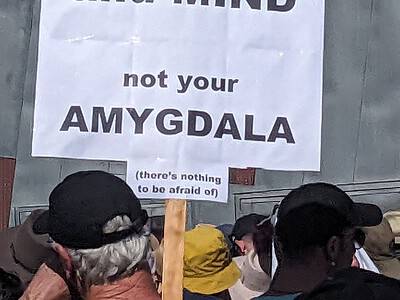
The NO campaign relies on ignorance. A key stance is “If you don’t know, Vote NO.”
What kind of a message does that send? Is that how you want your kids to think? Is that how you think debate on serious issues should be dealt with? Because that’s exactly how many leaders in the NO camp think.
If you’re completely ignorant on a topic, stay that way. That’s the stance. And this is from people such as Clive Palmer’s UAP, and prominent Liberal figures such as Michaela Cash who want the opportunity to actually lead this country. Imagine that sort of opinion as the power base of Australia. No, thanks.
Clive Palmer’s press release can’t even string more than three sentences together.
The Liberal Party’s social media is in overdrive promoting and celebrating ignorance.
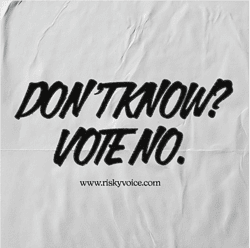
If the proposal succeeds, it will be the first in Australian history to be passed without bipartisan political support. That says more about the Liberal Party than anyone else.
The Voice proposal actually does exactly what many of the NO proponents state they want, as demonstrated in this Instagram post.
That’s what we call opposition for the sake of opposition.
If you don’t know, please find out
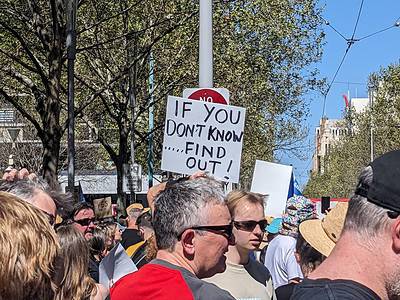
Regardless of whether you’re considering voting YES or NO, you must be informed.
Voting no because you couldn’t be bothered finding out is a cop out.
To be informed about what you are voting on is basic decency on a question of such significance, and it is truly revolting that major political parties are promoting and celebrating such ignorance.
This brilliant comic from The Guardian sums it up beautifully:
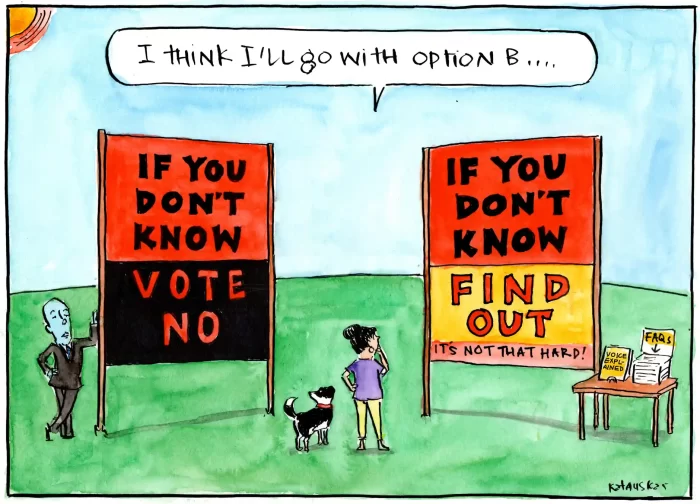
There is strong community, business, religious, and political support for the Voice
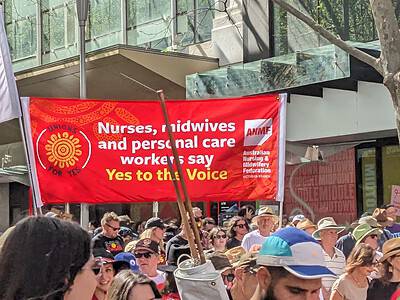
Support for the Voice is unsurprisingly high in Indigenous based organisations.
The majority of ASX 20 companies publicly back the proposal, which has even greater support from this group than the same-sex marriage plebiscite.
The Voice has the support of over 125 top health organizations, including Vichealth; the Australian Nursing and Midwifery Federation; Cancer Council Victoria; and Victorian Healthcare Association. They argue it will result in better health outcomes for Indigenous Australians.
The Royal Australian College of General Practitioners (RACGP) has publicly stated their support for the establishment of an Aboriginal and Torres Strait Islander Voice to Parliament in the Australian Constitution.
“The Voice to Parliament will help drive changes to improve health outcomes for Aboriginal and Torres Strait Islander peoples and address the inequity in our health system”
RACGP President Dr Nicole Higgins – “Having a say in matters that affect you is so important”: RACGP backs Voice to Parliament
The majority of Australian politicians also support the Voice. There are more conservative politicians supporting the YES vote than there are progressives supporting the NO vote.
As noted in the Sydney Morning Herald, conservative politicians like Kate Carnell (former Liberal ACT Chief Minister), Mike Baird (former Liberal NSW Premier), Jeremy Rockliff (Tasmanian Liberal Premier), Julian Leeser and Bridget Archer (federal Liberal backbenchers), ACT Liberal Opposition Leader Elizabeth Lee, former senator Gary Humphries and NSW Member for Manly James Griffin are strong proponents of the YES vote.
As also noted in that piece, Tony Nutt (John Howard’s former chief of staff), as well as Mark Textor (Liberal party pollster) actually sit on the board of the Australians for Indigenous Constitutional Recognition, the fundraising body for the Yes23 campaign.
Former Liberal foreign affairs minister Julie Bishop is also a strong supporter of the YES vote.
“I would be most concerned at the message this would send the rest of the world if we can’t find it in our hearts to say yes.”
Julie Bishop, as quoted in The Australian Finacial Review
There is also huge support from major sporting bodies, community groups, and professional organisations.
Major religious groups, such as the Catholic Church, Anglican Church, Uniting Church, Baptist Mission Australia, , the Australia National Council of Imams, the Executive Council of Australian Jewry, Australian Sikhs, Buddhists and Hindus all support the Voice to Parliament.
You can read statements from multiple church leaders and religious groups at the Victorian Council of Churches and the National Council of Churches in Australia websites.
In June 2023, the Law Council of Australia published their support for the “passage of Constitutional Alteration to provide for the Voice.”
“The Law Council has long supported a constitutionally enshrined Voice as a necessary and overdue recognition of First Nations peoples in the Australian Constitution.”
Law Council of Australia – Law Council welcomes passage of Constitutional Alteration to provide for the Voice
For the most part, these are groups whose opinions we value, even if we don’t always agree with them. Given the choice, we’d be siding with this lot over the likes of Pauline Hanson, Clive Palmer, and Peter Dutton.
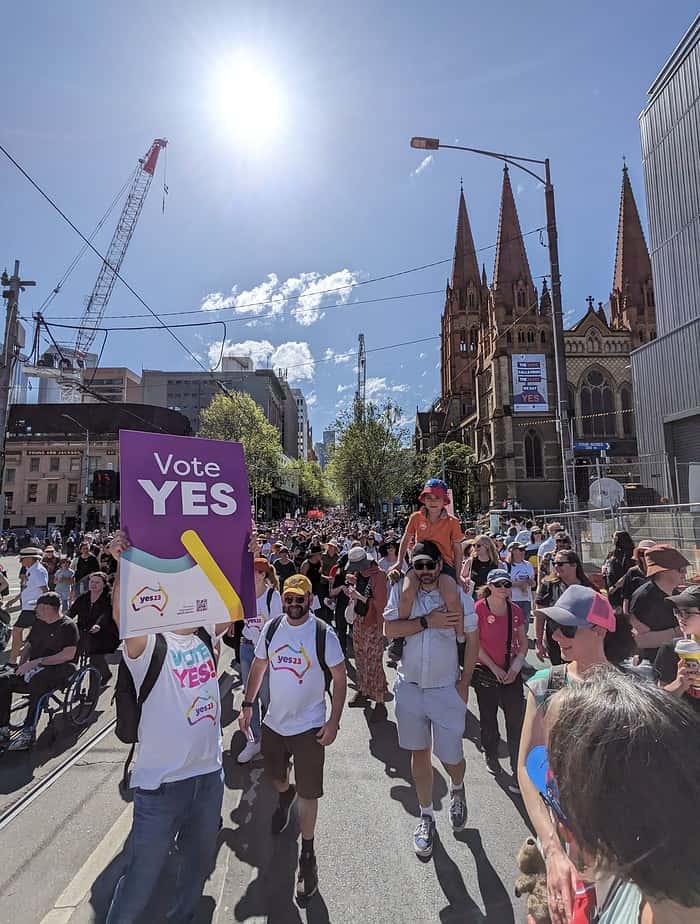
It's time to listen
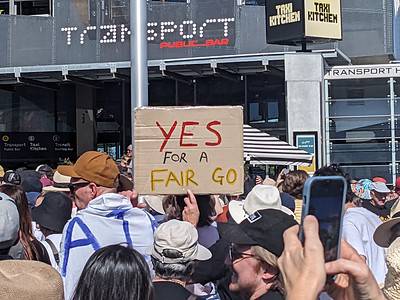
There have been more than a few metaphors for the Voice to help people understand its worth.
A couple of the best ones relate to how it feels to be at work and not listened to. You know the bosses are making decisions that are wasting time and money, yet they won’t listen to the people who are impacted by those decisions. This is analogous to the Voice.
Another is regarding women’s rights. This brilliant TikTok post articulates it far better than we could:
We’ve tried to avoid quoting politicians in this piece, as this issue should be above politics. However, Daniel Andrews (former Victorian Premier) had this to say in August, and it’s a sentiment we entirely agree with:
“If we listen to Aboriginal people about their babies being sick, about their parents dying decades before they should, about their job opportunities, their education, about their business, about the things that they have the greatest stake in, then we will do better.
“Because you always do better when you listen. Beyond that, I’ll just make the point, all of us as taxpayers, we’re spending billions of dollars, billions of dollars every year, to fail. These programs are not working.
“There’s a better way, and instead of continuing with the proven unsuccessful, incredibly inefficient, costly way, which is telling Aboriginal people how it ought to be. We should do something different. We should listen to them. It’s really simple for me.
“That’s why I’m voting yes. That’s why I hope other Victorians will vote yes, because there’s got to be a better way…because we’re all sharing in the cost of failure in dollars, and in tragic human terms.”
Daniel Andrews, as quoted on Sky News
It’s not perfect, but it’s better than the alternative
A win for YES won’t solve everything, and anything it does solve is still some way off. A vote for NO, however, is a huge step backwards, and something we believe this country would (and should) be ashamed of if it were to happen.
We can’t let perfect get in the way of good. Something is better than nothing and the Voice is a great start.
The outcome of the vote will have no tangible impact on 97% of the population. It is a moral imperative for the 97% to vote for the 3%.
We all have an opportunity and an obligation to vote YES. That’s all there is to it. Any step forward that gives First Nations peoples a greater say in decisions that affect their lives is a step worth taking.
Together, we can, and must, make a difference.
